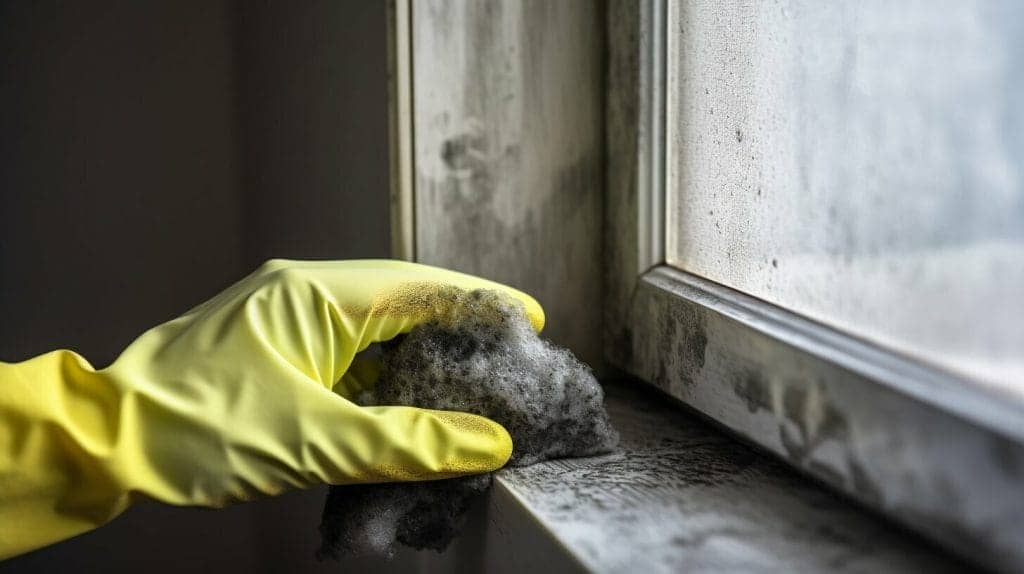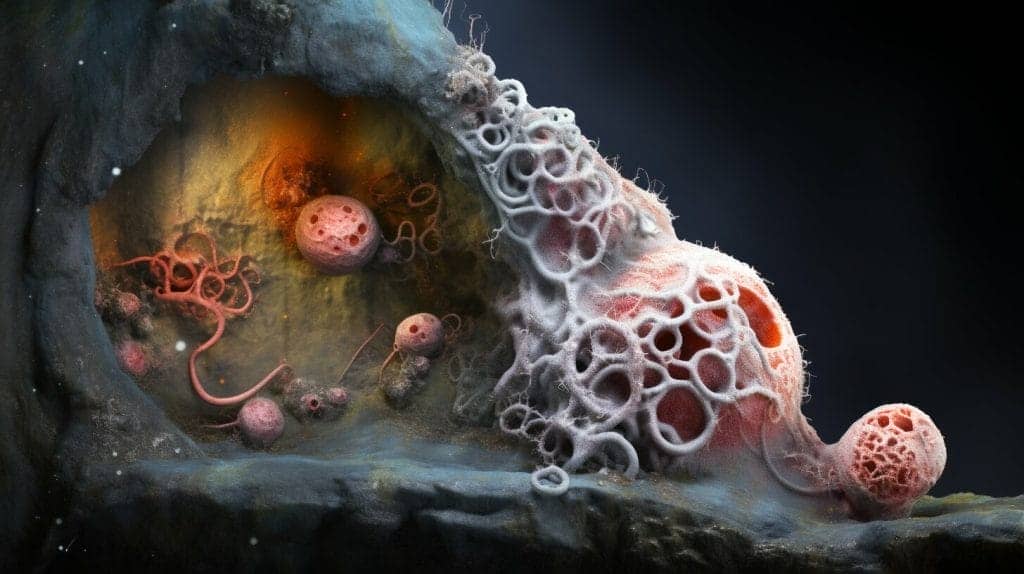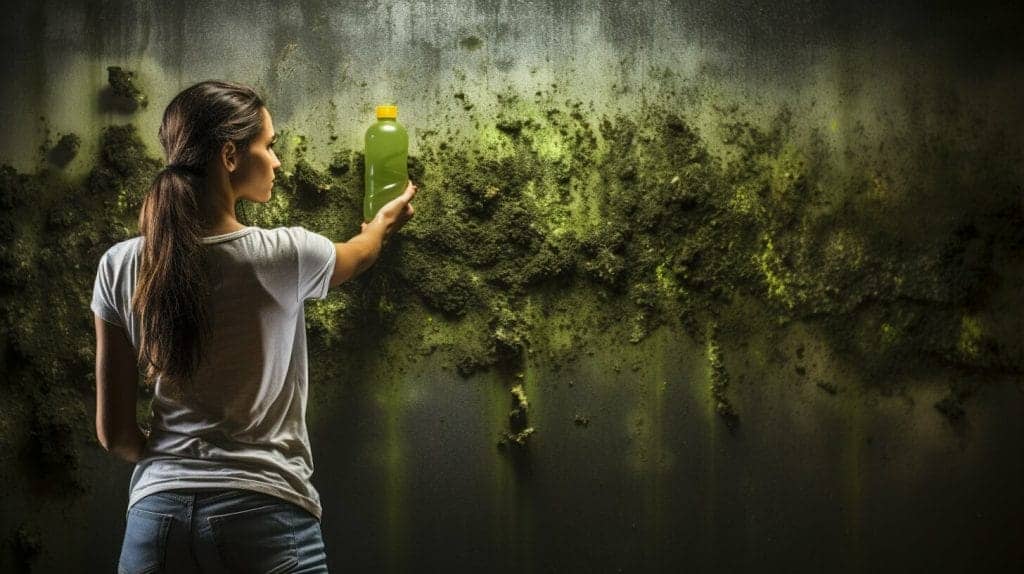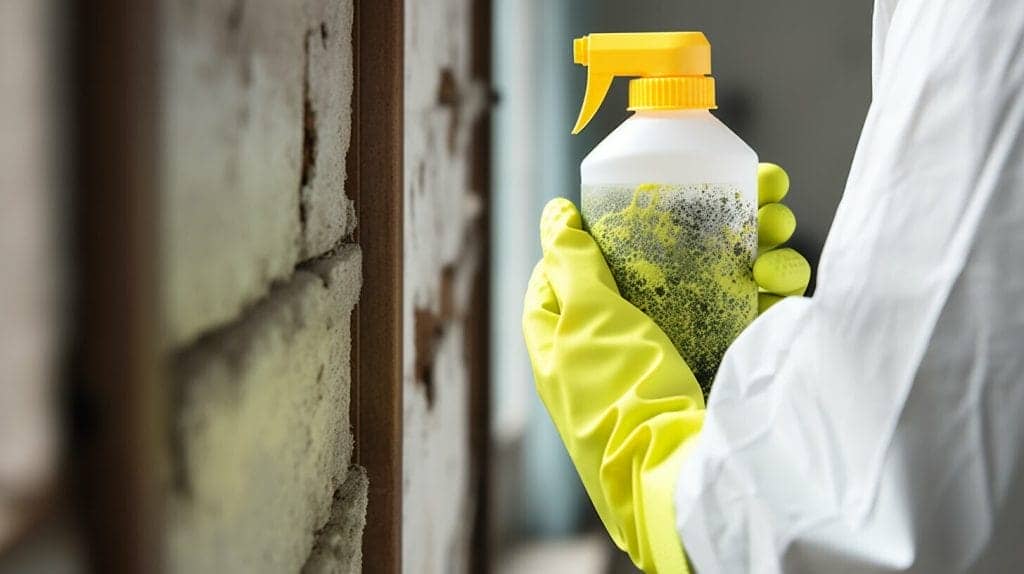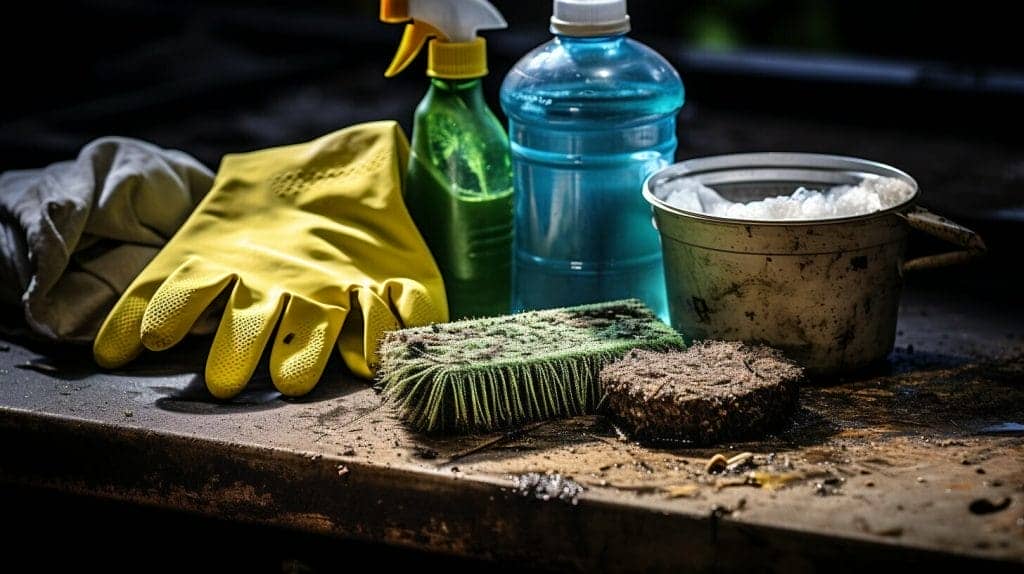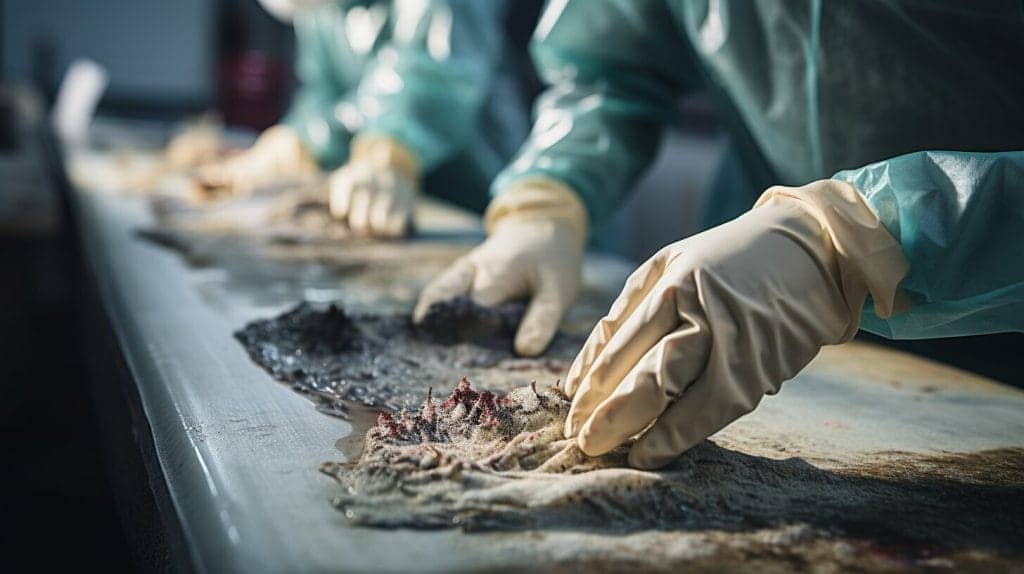Welcome to this informative article about the potential link between toxic mold and thyroid problems. The thyroid gland is a crucial part of the human body, producing hormones that regulate metabolism, growth, and the functioning of many organs. However, external factors such as toxic mold exposure can have a significant impact on thyroid health.
In this article, we will explore the role of the thyroid gland, the dangers of toxic mold exposure, and the research linking mold toxins to thyroid dysfunction. We will also discuss the symptoms of mold-related thyroid problems, diagnosis, treatment options, and prevention measures.
If you are concerned about the effects of mold exposure on your thyroid health, you’ve come to the right place. Let’s dive in and discover what you need to know about the potential link between toxic mold and thyroid problems.
Understanding the Thyroid Gland and Its Function
The thyroid gland is a small butterfly-shaped gland located in the neck, just below the Adam’s apple. It plays a crucial role in regulating various bodily functions, including metabolism, growth, and development. The thyroid gland produces two hormones, namely thyroxine (T4) and triiodothyronine (T3), which help to regulate these bodily functions.
When the thyroid gland is functioning correctly, it produces the right amount of hormones needed by the body. However, when the thyroid gland is not functioning correctly, it can result in either hypothyroidism (underactive thyroid) or hyperthyroidism (overactive thyroid).
Hypothyroidism can lead to weight gain, fatigue, and sensitivity to cold. Hyperthyroidism, on the other hand, can result in weight loss, anxiety, and irritability. Both conditions can have a significant impact on an individual’s quality of life, and if left untreated, can lead to severe complications.
Various factors can affect the thyroid gland, including exposure to toxins in the environment, such as mold. Next, we’ll explore the connection between toxic mold and thyroid problems.
What is Toxic Mold?
Toxic mold is a type of mold that produces harmful toxins known as mycotoxins. These mycotoxins can be found on surfaces where the mold is growing and can also become airborne, leading to exposure through inhalation. Toxic mold can grow in any environment with excessive moisture and can be found in homes, offices, and schools.
| Types of Toxic Mold | Conditions for Growth |
|---|---|
| Stachybotrys Chartarum (Black Mold) | Water damage, high humidity levels |
| Aspergillus | Warm and damp environments, water damage |
| Penicillium | Water damage, damp environments |
Symptoms of toxic mold exposure can vary depending on the individual and the extent of exposure. These symptoms may include respiratory problems, headaches, fatigue, and skin irritation. In some cases, exposure to toxic mold can lead to more serious health problems.
If you suspect that you have toxic mold in your environment, it is important to address the issue as soon as possible. This can involve removing the mold and fixing any moisture problems that may be contributing to its growth. Seeking professional assistance may be necessary to ensure that the mold is properly removed and that any health hazards are mitigated.
The Link Between Toxic Mold and Thyroid Problems
Research has shown that exposure to toxic mold can have a negative impact on thyroid function. Mold toxins, also known as mycotoxins, can interfere with the production of thyroid hormones and disrupt the endocrine system. The thyroid gland is responsible for regulating metabolism, growth, and development, and any disruption in its function can have significant consequences for overall health.
A study published in the journal Thyroid Research found a correlation between mold exposure and thyroid dysfunction. The study found that individuals with higher levels of mycotoxins in their urine were more likely to have abnormal thyroid function tests. The authors of the study concluded that mold exposure should be considered as a potential cause of thyroid problems.
Another study published in the Archives of Environmental Health found that exposure to mold and other environmental toxins can lead to autoimmune thyroid disease. Autoimmune thyroid disease occurs when the immune system attacks the thyroid gland, leading to inflammation and damage. This can result in hypothyroidism, or low thyroid function.
The Effects of Mold on Thyroid
Mold toxins can affect the thyroid gland in several ways. Firstly, mycotoxins can interfere with the conversion of thyroid hormones from their inactive to their active form. This can lead to a buildup of inactive thyroid hormones, which can cause symptoms of hypothyroidism.
Secondly, mold toxins can disrupt the release of thyroid hormones from the thyroid gland. This can lead to a condition called subclinical hypothyroidism, where thyroid hormone levels are below normal but not low enough to be diagnosed as hypothyroidism.
Finally, mold toxins can stimulate the immune system to attack the thyroid gland, leading to autoimmune thyroid disease. This can result in hypothyroidism or hyperthyroidism, where the thyroid gland produces too much thyroid hormone.
Symptoms of Mold-Related Thyroid Problems
Thyroid problems can be caused by a variety of factors, including exposure to toxic mold. If you suspect that you may have mold-related thyroid problems, it’s important to be aware of the symptoms that may occur.
Here are some of the most common symptoms of mold-related thyroid problems:
- Unexplained weight gain or loss
- Changes in appetite
- Fatigue or exhaustion
- Muscle weakness
- Joint pain or stiffness
- Hair loss or thinning
- Changes in skin texture or appearance
- Difficulty sleeping
- Increased sensitivity to cold or heat
- Irritability or mood swings
- Anxiety or depression
If you are experiencing any of these symptoms and suspect that mold exposure may be the cause, it’s important to seek medical attention. Your doctor can perform tests to determine whether your thyroid function has been affected and can recommend appropriate treatment options.
Diagnosis of Mold-Related Thyroid Problems
If you suspect that you may have mold-related thyroid problems, it’s important to see a healthcare professional for an accurate diagnosis. Your doctor may perform several tests to assess your thyroid function and determine if mold toxins are present in your body.
One of the most common tests used to diagnose thyroid problems is a blood test that measures levels of thyroid hormones. Your doctor may also order an ultrasound to check for any abnormalities in the thyroid gland.
If mold exposure is suspected, your doctor may order specialized tests to check for the presence of mold toxins in your body. These tests may include a urine test or a blood test that looks for specific mold antibodies.
If mold-related thyroid problems are diagnosed, your doctor may recommend treatment with thyroid hormone replacement therapy. In some cases, medications may also be prescribed to help remove mold toxins from the body.
If you have been diagnosed with mold-related thyroid problems, it’s important to address the underlying mold issue to prevent further exposure. Seek the help of a professional mold remediation company to safely and effectively remove any mold from your home or workplace.
Treatment for Mold-Related Thyroid Problems
The treatment for mold-related thyroid problems will depend on the severity of symptoms and the extent of mold exposure. In many cases, treating the underlying cause of the problem, which is exposure to mold toxins, can help reduce symptoms and improve thyroid function.
| Treatment Options | Description |
|---|---|
| Antifungal Medications | Antifungal medications can help reduce the levels of mold toxins in the body and may alleviate symptoms. However, these medications are not always effective and can have side effects. |
| Thyroid Hormone Replacement | In cases where mold exposure has caused thyroid dysfunction, thyroid hormone replacement therapy may be recommended to restore normal thyroid function. However, this will not address the underlying mold exposure and may not be effective if exposure continues. |
| Immune System Support | Supporting the immune system through a healthy diet, regular exercise, and stress management can help improve overall health and reduce susceptibility to mold-related health problems. |
It is important to work with a healthcare professional who is familiar with mold-related health problems and can provide tailored treatment recommendations based on individual symptoms and circumstances.
Prevention of Mold-Related Thyroid Problems
Preventing mold-related thyroid problems is crucial to maintaining a healthy thyroid gland. Here are some tips to help reduce the risk of mold exposure:
- Identify and address any mold problems in your home or workplace. This may involve hiring a professional to conduct a mold inspection and remediation.
- Keep your living and work spaces well-ventilated to help reduce humidity and moisture levels.
- Use dehumidifiers in areas that are prone to moisture or dampness.
- Clean and dry any areas that become wet or damp within 24-48 hours.
- Use an air purifier or filter to help reduce the amount of mold spores in the air.
- Wear protective gear, such as a mask and gloves, when cleaning areas contaminated with mold.
- Regularly clean and maintain household appliances, such as air conditioners and humidifiers, to help prevent mold growth.
By taking these preventative measures, you can help reduce your risk of mold-related thyroid problems and maintain good thyroid health.
Common Myths and Misconceptions About Mold and Thyroid Problems
There are many myths and misconceptions about the link between mold and thyroid problems. Let’s take a closer look at some of the most common ones:
| Myth | Fact |
|---|---|
| Mold only affects people with allergies or respiratory problems. | Mold can affect anyone, regardless of their health status. |
| Only black mold is dangerous. | All types of mold can be harmful to human health. |
| If you can’t see mold, it’s not there. | Mold can grow in hidden areas, such as behind walls or under flooring. |
| Cleaning up mold with bleach is enough to remove it. | Bleach is not effective in removing mold completely and can actually make the problem worse. |
| Mold-related health problems are always immediate. | Mold-related health problems can appear immediately or develop over time. |
It’s important to separate fact from fiction when it comes to mold and thyroid problems. By understanding the true risks and potential consequences of mold exposure, individuals can take steps to protect their health and well-being.
Frequently Asked Questions About Mold-Related Thyroid Problems
Here are some common questions and answers related to mold-related thyroid problems:
Can toxic mold cause thyroid problems?
Research has suggested that exposure to toxic mold can lead to thyroid dysfunction, which may cause various symptoms such as fatigue, weight gain, and hair loss.
What are the symptoms of mold-related thyroid problems?
Some symptoms that may indicate mold-related thyroid problems include fatigue, depression, weight gain, difficulty concentrating, and hair loss.
How are mold-related thyroid problems diagnosed?
Diagnostic tests may include blood tests to assess thyroid function and the presence of mold toxins in the body. A physical exam and medical history may also be conducted.
What are the treatment options for mold-related thyroid problems?
Treatment may vary depending on the severity of symptoms and the extent of mold exposure. Options may include medication to regulate thyroid function, dietary changes, and addressing mold exposure through remediation.
How can mold-related thyroid problems be prevented?
Prevention methods may include identifying and addressing mold problems in the home or workplace, improving indoor air quality, and using protective gear when working in areas with mold.
Is it possible to recover from mold-related thyroid problems?
With appropriate treatment and management of mold exposure, it is possible to recover from mold-related thyroid problems and improve overall thyroid function.
Can mold-related thyroid problems be life-threatening?
In severe cases, mold-related thyroid problems can potentially become life-threatening. It is important to seek medical attention if symptoms persist or worsen.
Conclusion
In conclusion, while there is still ongoing research regarding the link between toxic mold and thyroid problems, it is important to take mold exposure seriously. The thyroid gland plays a crucial role in bodily function and can be negatively impacted by external factors such as toxic mold.
If you experience symptoms of mold-related thyroid problems, it is important to seek medical attention and get a proper diagnosis. Treatment options may vary depending on the severity of symptoms and the extent of mold exposure.
Prevention is key when it comes to mold-related thyroid problems. Taking steps to identify and address mold problems in the home or workplace can go a long way in reducing exposure to mold toxins and preventing potential health issues.
Stay Informed
Be sure to stay informed and educate yourself on the risks associated with toxic mold exposure and how it can affect thyroid function. By taking preventative measures and seeking medical attention when necessary, you can help protect your health and well-being.
Dr. Francisco Contreras, MD is a renowned integrative medical physician with over 20 years of dedicated experience in the field of integrative medicine. As the Medical Director of the Oasis of Hope Hospital in Tijuana, Mexico, he has pioneered innovative treatments and integrative approaches that have been recognized globally for the treatment of cancer, Lyme Disease, Mold Toxicity, and chronic disease using alternative treatment modalities. Dr. Contreras holds a medical degree from the Autonomous University of Mexico in Toluca, and speciality in surgical oncology from the University of Vienna in Austria.
Under his visionary leadership, the Oasis of Hope Hospital has emerged as a leading institution, renowned for its innovative treatments and patient-centric approach for treating cancer, Lyme Disease, Mold Toxicity, Long-Haul COVID, and chronic disease. The hospital, under Dr. Contreras's guidance, has successfully treated thousands of patients, many of whom traveled from different parts of the world, seeking the unique and compassionate care the institution offers.
Dr. Contreras has contributed to numerous research papers, articles, and medical journals, solidifying his expertise in the realm of integrative medicine. His commitment to patient care and evidence-based treatments has earned him a reputation for trustworthiness and excellence. Dr. Contreras is frequently invited to speak at international conferences and has been featured on CNN, WMAR2 News, KGUN9 News, Tyent USA, and various others for his groundbreaking work. His dedication to the medical community and his patients is unwavering, making him a leading authority in the field.
Contreras has authored and co-authored several books concerning integrative therapy, cancer, Lyme Disease and heart disease prevention and chronic illness, including "The Art Science of Undermining Cancer", "The Art & Science of Undermining Cancer: Strategies to Slow, Control, Reverse", "Look Younger, Live Longer: 10 Steps to Reverse Aging and Live a Vibrant Life", "The Coming Cancer Cure Your Guide to effective alternative, conventional and integrative therapies", "Hope Medicine & Healing", "Health in the 21st Century: Will Doctors Survive?", "Healthy Heart: An alternative guide to a healthy heart", “The Hope of Living Cancer Free”, “Hope Of Living Long And Well: 10 Steps to look younger, feel better, live longer” “Fighting Cancer 20 Different Ways”, "50 Critical Cancer Answers: Your Personal Battle Plan for Beating Cancer", "To Beat . . . Or Not to Beat?", and “Dismantling Cancer.”



